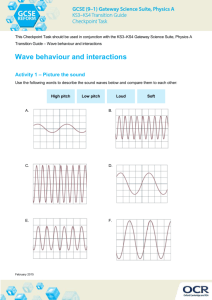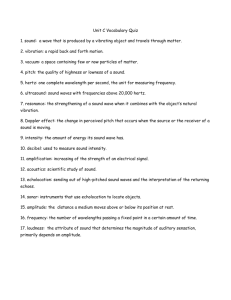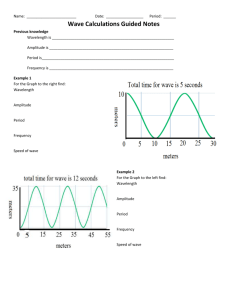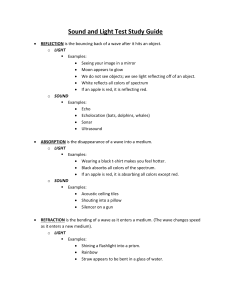File
advertisement
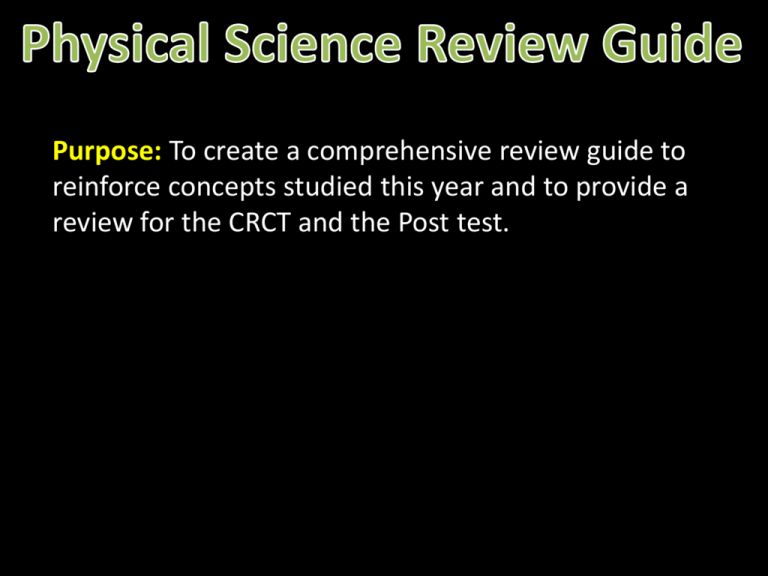
Purpose: To create a comprehensive review guide to reinforce concepts studied this year and to provide a review for the CRCT and the Post test. Table of Contents: 1. Atoms and Molecules 2. Physical and Chemical Properties/Changes 3. Periodic Table 4. Potential and Kinetic Energy 5. Forms and Transformations of Energy 6. Heat 7. Waves 8. Sound 9. Light 10. Speed 11. Newton’s Laws 12. Gravity 13. Work and Simple Machines 14. Magnetism 15. Electricity EQ: What is the difference between atoms and molecules? Vocabulary: Define and provide an example of each of the following: • Atoms • Elements • Molecules • Compounds • Pure Substance • Mixture Copy this picture and explain which vocabulary word(s) best describe it. Physical Property Definition: Physical Change Definition: Examples: Examples: Chemical Property Definition: Chemical Change Definition: Examples: Examples: EQ: How are atoms of different elements different? EQ: How are the elements organized on the Periodic Table? Vocabulary: Define and provide an example of each of the following: • Metal • Metalloid Draw and label a square • Nonmetal for any element on the • Group/Family/Column Periodic Table (p. 338-339) • Period • Atomic Number • Atomic Mass Define and provide examples for potential and kinetic energy. Illustrate and describe how potential and kinetic energy change in either a swinging pendulum or a roller coaster. Start here Define and provide examples Identify the energy for each of the forms of transformations that take place energy listed below: in the following devices: 1. Mechanical 1. Battery 2. Radiant (light) 2. Light bulb 3. Thermal (heat) 3. Flash light 4. Electrical 4. Generator 5. Sound 5. Motor State the Law of Conservation of Energy. EQ: What is the difference between heat and thermal energy? EQ: Why does an ice cube sitting in the sun melt? Vocabulary: Define and provide an example of each of the following: • Temperature • Thermal expansion • Convection (illustrate and describe!) • Conduction (illustrate and describe!) • Radiation (illustrate and describe!) Waves carry/transfer __________________. EQ: What is the difference between an electromagnetic and a mechanical wave? Illustrate a transverse and a longitudinal wave. Label each wave with the following terms: Transverse Wave: Longitudinal Wave: • Amplitude • Amplitude • Wavelength • Wavelength • Compression • Rarefaction EQ: How are sound waves affected by pitch and amplitude? Draw a sound wave for a quiet sound. Draw a sound wave for a loud sound. Draw a sound wave for a high pitch sound. Draw a sound wave for a low pitch sound. High pitch = __________ frequency __________ frequency __________ wavelength Low pitch = __________ wavelength __________ energy __________ energy --------No Connection!!!-------High volume = _________ amplitude __________ energy Low volume = __________ amplitude __________ energy EQ: According to the Doppler effect, how do sounds change as the source moves closer or farther away from the listener? EQ: What kind of wave is a light wave? EQ: What is the difference between different colors? FACT: White light is made up of all the colors of the rainbow. When white light shines on a… 1. 2. 3. 4. 5. (see p. 654) red strawberry, red is ________ and all other colors are _________. blue shirt, blue is _______ and all other colors are __________. green leaf, green is _______ and all other colors are __________. black jacket, ___________________________________________. white piece of paper, ____________________________________. Define and illustrate the following: • Refraction • Reflection Define the following terms: Speed, velocity, acceleration Copy the graphs below and use the words above to describe the motion they show. Define the following terms: • Inertia • Balanced force • Unbalanced force • Mass • Friction Copy and complete the following statement: _______ (More/less) force is needed to move an object with _______ (high/low) mass. Describe a real-world example of Newton’s 1st and 2nd Laws. Newton’s 1st Law Newton’s 2nd Law Complete the sentence below using the following words: Gravity Mass Weight ___________ is determined by ___________ which is caused by an object’s ___________. EQ: How is the force of gravity affected by the distance between objects? (2 ways) EQ: How is the force of gravity affected by the mass of objects? (2 ways) EQ: How do machines make work easier? Give a definition and a real-world example of each of the 6 types of simple machines. Lever Pulley Wheel and axle Wedge Inclined plane Screw EQ: What are 2 ways to increase the strength of an electromagnet? (p. 520) EQ: How do a solenoid and an iron core work together to make an electromagnet? (p. 520) Use ALL of the following words to describe how a magnet can be used to induce an electric current: • Magnet • Force (push/pull) • Same and opposite charges • Electrons • Poles • Electricity Compare and contrast series and parallel circuits. Series circuit Parallel circuit
